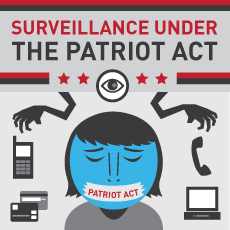
In 2007, The Washington Post made an exception to its policy against anonymous op-eds and ran a piece by Nicholas Merrill, who at the time was legally barred from identifying himself as having been served with a National Security Letter under the Patriot Act.
Last year, after challenging the statute with the ACLU, Merrill was able to reveal his name. But he is still prohibited from giving information about the investigation that was launched back in 2004. Yesterday, on the 10th anniversary of the law, the Post printed a new op-ed by Merrill that describes his experience with the law that has fundamentally altered all Americans' relationship with the government:
In 2004, it wasn’t at all clear whether the FBI would charge me with a crime for telling the ACLU about the letter, or for telling the court clerk about it when I filed my lawsuit as “John Doe.” I was unable to tell my family, friends, colleagues or my company’s clients, and I had to lie about where I was going when I visited my attorneys. During that time my father was battling cancer and, in 2008, he succumbed to his illness. I was never able to tell him what I was going through.
For years, the government implausibly claimed that if I were able to identify myself as the plaintiff in the case, irreparable damage to national security would result. But I did not believe then, nor do I believe now, that the FBI’s gag order was motivated by legitimate national security concerns. It was motivated by a desire to insulate the FBI from public criticism and oversight…
I don’t believe that it’s right for Americans’ free speech rights to be bound by perpetual gag orders that can’t be meaningfully challenged in a court of law. The courts agreed, but the NSLs and the gag orders live on. Now the FBI is supposed to notify NSL recipients that they can challenge a gag order — but the government refuses to say how the court’s ruling has been put into practice, or how many gag orders have been issued, challenged or reversed. This information is especially important since internal Justice Department investigations have found widespread violations of NSL rules by the FBI.
During the recent debate to reauthorize sections of the Patriot Act, two members of the Senate Intelligence Committee — Mark Udall (D-Colo.) and Ron Wyden (D-Ore.) — warned that the government is interpreting the law to conduct surveillance that does not follow from a plain reading of the text. “When the American people find out how their government has secretly interpreted the Patriot Act, they will be stunned and they will be angry,” Wyden said. As someone who had to keep silent and live a lie for the better part of a decade, in the false name of “national security,” I know he’s right.
Merrill was also interviewed for an NPR report yesterday on how contrary to the law's original intent, the government is using the Patriot Act mainly for investigations that are not related to terrorism. You can listen here.
Learn more about the Patriot Act: Sign up for breaking news alerts, follow us on Twitter, and like us on Facebook.

